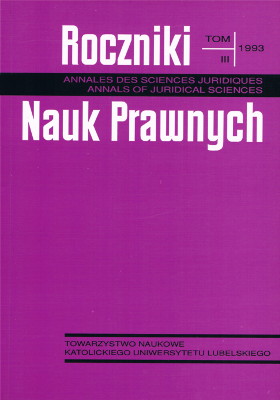Sacrilegium in the Roman Law as the Theft of Holy Things from a Holy Place
Abstract
Sacrilege (sacrilegium) was treated in the Roman Law as one of the kinds of theft (furtum). In the present paper the author discusses the constitutive elements of his crime. The object of sacrilege were the things publicly devoted to the Roman gods (res sacrae). Sacrilege could only be committed towards these things which were in the temple (in aede sacra). Initially, until the turn of the second and third centuries AD the non-sanctified things (res profana), belonging to private people (res privata), and deposed in the temple, were also the object of sacrilegium. From the proclamation of the bill of Severus and Caracala (d. 48, 13, 6). In the case of stealing such things from the temple one could only apply action furti. Similarly as in the case of furtum the object of sacrilegium was only mobile things (res mobiles).
A further element was contrectiatio, i. e. the unlawful touching of the holy thing. Then it was a bad motive (animus furandi, contrectatio fraudulosa). The source material dealing with the latter is very bleak, and does not allow for a more profound analysis of the meaning and evolution of this medieval element of sacrilege. The question under discussion in literature is how to understand the expression pecunia religiosa used by the bill Lex Iulia peculatus (D. 48, 13, 1:4) and Lex municipii Tarentini. The author devoted much space to this problem, considering at the same time whether the things called pecunia religiosa were the object of sacrilegium. The first know bill which concerned the theft of holy things was Lex Iulia peculates, issued at the end of the first century BC. Its text, know from jurists, does not contain such terms as sacrilegium or sacrilegius which were very often used in the literature of that epoch. The author assumes then that the word sacrilegium in use in the end of the republic and at the beginning of the Principate was an expression of common parlance. In was not used in the technical sense or legal sense to signify crime. At that time sacrilegium constituted a form, a variety of the theft of things belonging to the state (peculates).
Copyright (c) 1993 Roczniki Nauk Prawnych

This work is licensed under a Creative Commons Attribution-NonCommercial-NoDerivatives 4.0 International License.


